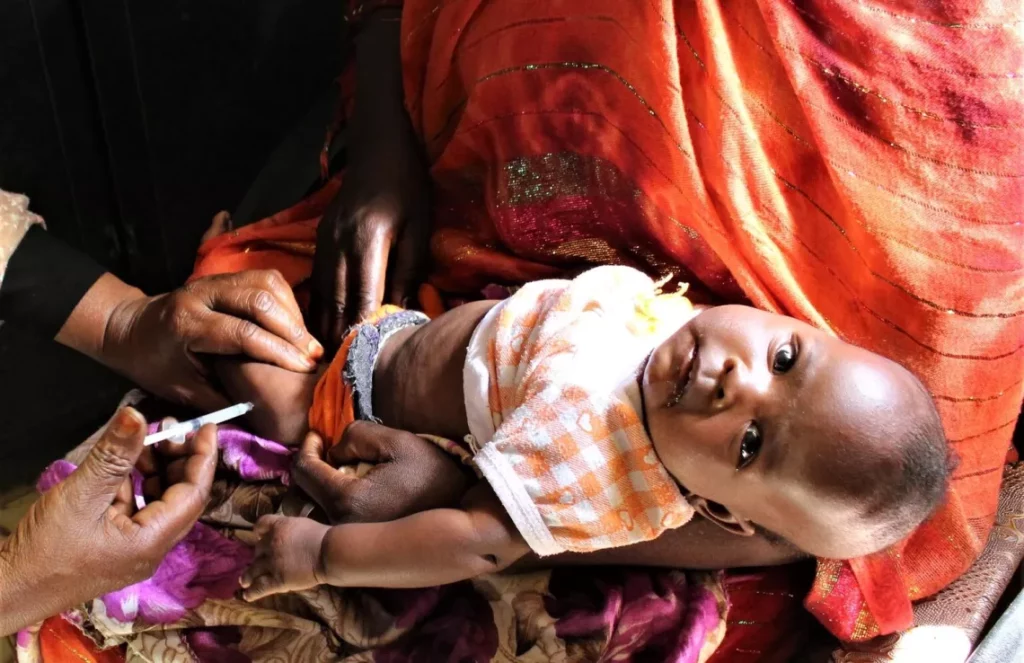Save the Children calls on int’l community to prevent death of 230,000 children and new mothers in Sudan

An infant in Sudan receives a vaccination, in 2020 (File photo: Bos / UNICEF Sudan)
Nearly 230,000 children, pregnant women and new mothers could die in the coming months due to hunger unless urgent, life-saving funding is released to respond to the massive and worsening crisis in Sudan, Save the Children says.
More than 2.9 million children in Sudan are acutely malnourished and an additional 729,000 children under five are suffering from severe acute malnutrition – the most dangerous and deadly form of extreme hunger, according to new figures released by the Nutrition Cluster* in Sudan, Save the Children said in a call on the international community two days ago.
According to the cluster, about 222,000 severely malnourished children and more than 7,000 new mothers are likely to die in coming months if their nutritional and health needs remain unmet. This grim projection is based on the current funding levels for the emergency feeding programme in Sudan, which at the moment only covers 5.5 per cent of the total needs in the country – compared with 23 per cent last year.
Without addressing the funding gap, about 1.2 million pregnant and breastfeeding women will suffer from malnutrition this year and face severe health complications during and after delivery. The figures released today reveal a stark deterioration in the ability for humanitarian organisations to reach people in need, with an unprecedented lack of funding and critical lack of access.
Destruction of the in-country supply chain for ready to use therapeutic foods has also severely hampered the aid response to the crisis, Save the Children says. In particular, the only manufacturer of the food needed for rehabilitating children and women with severe acute malnutrition, the Samil Foods factory, which produced the vital nutritious peanut paste called ‘Plumpy Nut’, is no longer operational after it was destroyed in May last year during fighting between the Sudanese army and the Rapid Support Forces (RSF).
Since the conflict between Sudan’s two armies escalated in April last year, food production has crashed, imports have stalled, and staple food prices have soared by 45 per cent within less than a year. Transport of food across the country, particularly to rural and remote areas where most people live, have also been severely restricted due to conflict, driving more than 37 per cent of the population into above crisis levels of hunger, Save the Children Internation stated.
Needed soon
“The nutrition situation – the ability for children and other vulnerable groups to get the food they need in order to grow and survive – in Sudan is one of the worst in the world,” Arif Noor, country director for Save the Children in Sudan. “We are seeing massive hunger, suffering and death. And yet the world looks away. The international community must come together to act and prevent more lives being lost. History will remember this inaction.”
Sudan is facing one of the largest unfolding crises globally. About 25 million people – of whom over 14 million are children – need humanitarian assistance and support. That is every second person in Sudan needing assistance to meet their basic needs.
“Save the Children is calling on the international community to commit the funding and resources to prepare for a large-scale response to meet critical needs both in Sudan and in neighbouring countries, including to local and national organisations providing frontline response.
“The child rights organisation is also calling for an end to the conflict and unfettered humanitarian access so that we can provide families and children with life-saving food, health and other vital basic services and supplies,” the report concludes.
* The Sudan Nutrition Cluster is a partnership of organisations including UN agencies, INGOs including Save the Children, and the Sudanese Ministry of Health.











 and then
and then